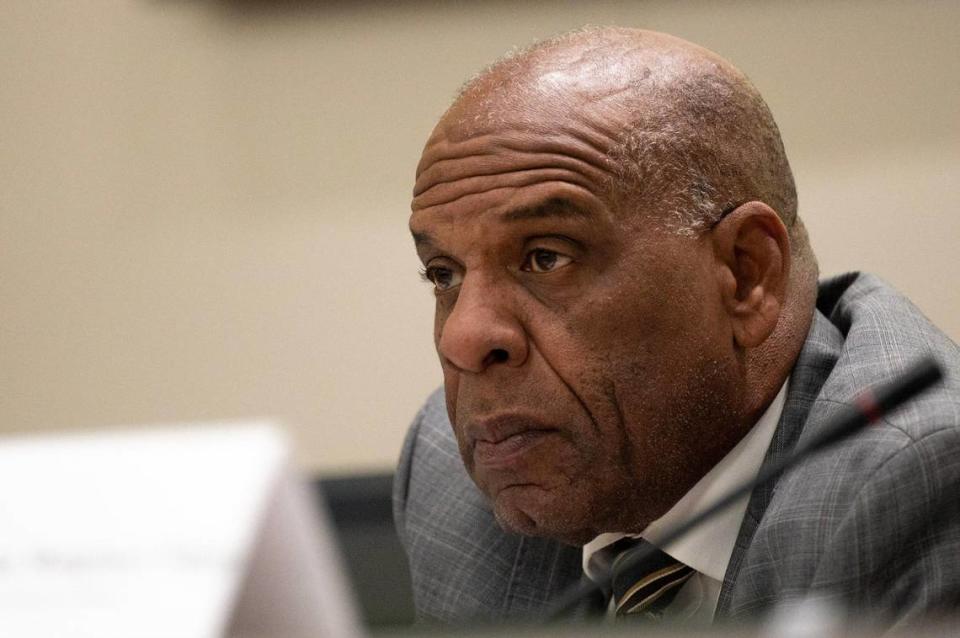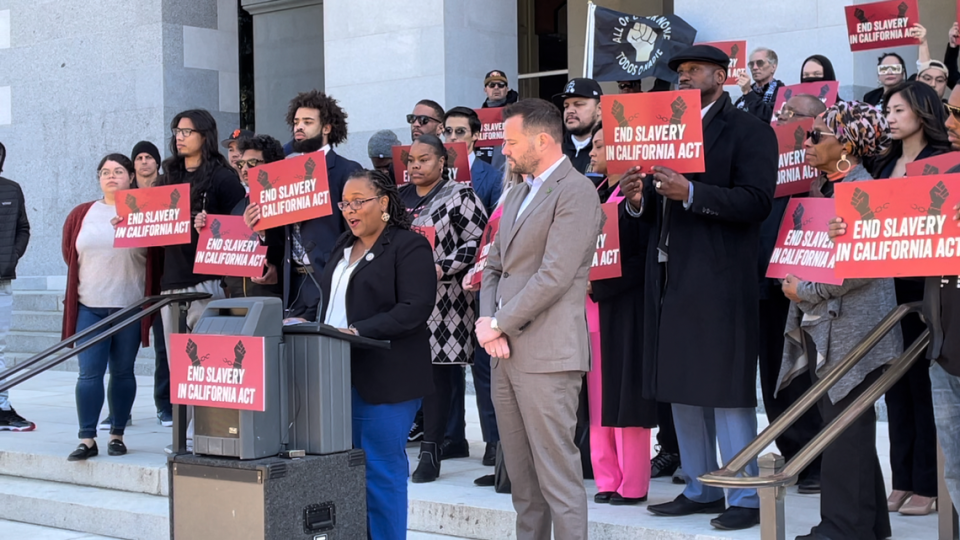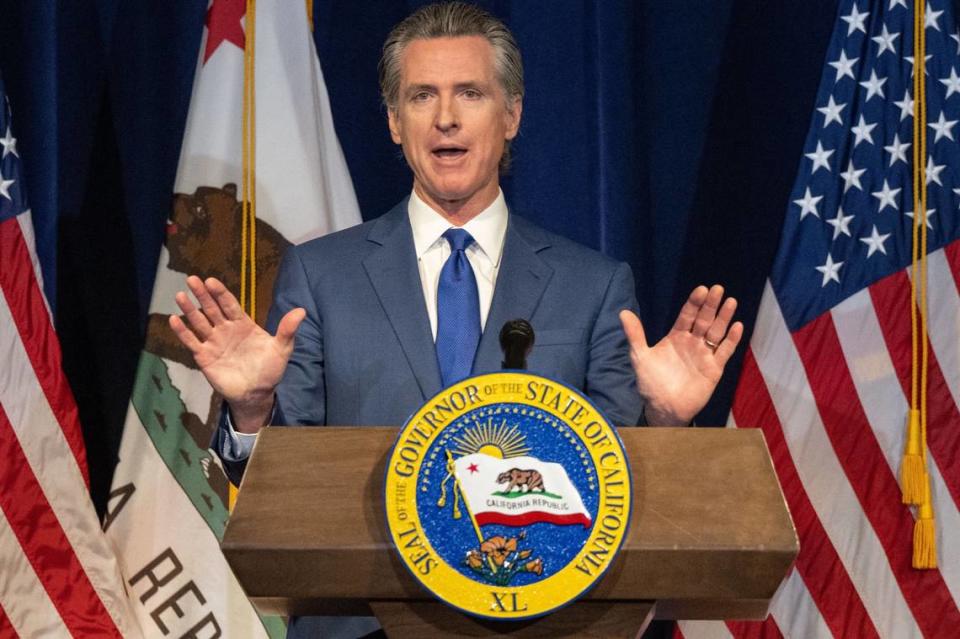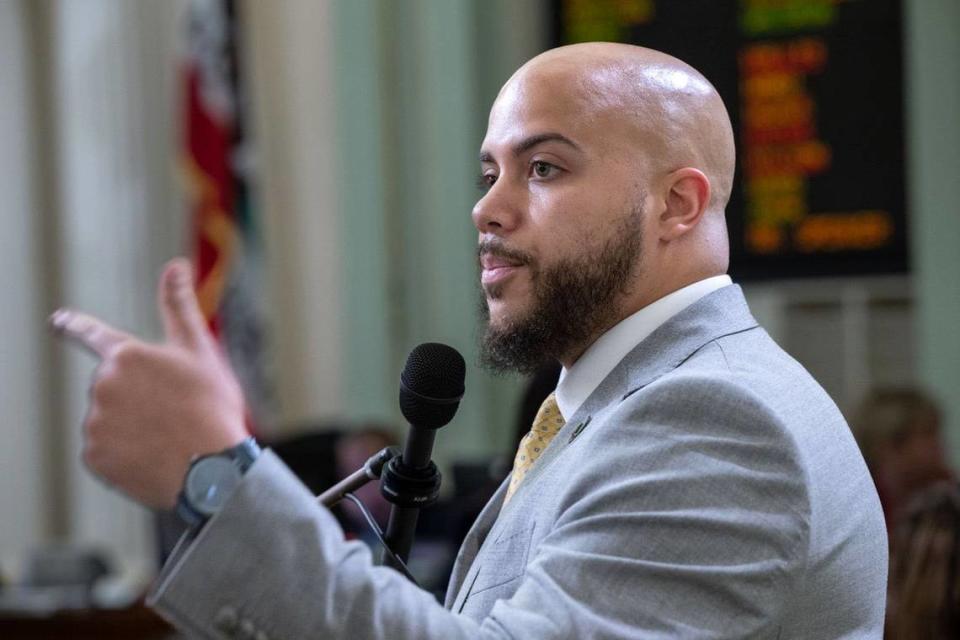California lawmakers finally tackle reparations. Will $68 billion budget deficit get in the way?
- Oops!Something went wrong.Please try again later.
- Oops!Something went wrong.Please try again later.
California lawmakers next year face huge political and financial challenges as they seriously consider reparations for Black descendants of slaves.
While Gov. Gavin Newsom and legislative lawamakers tend to agree there’s a great historic injustice that needs to be righted, implementing any reparations policy faces these flashpoints:
▪ The budget. The $68 billion state budget gap could make the already daunting task of paying for any reparations a lot tougher.
▪ The voters. They’re about to start casting primary election ballots in a just a few weeks, and Californians have mixed opinions about how to handle the issue.
▪ The governor. As Newsom actively seeks to boost his national stature, will he be eager to defend reparations?
The Legislative Black Caucus next month plans to unveil the first handful of bills addressing recommendations the state’s reparations task force spent years developing.
Newsom and Democrats in 2020 cheered the creation of the group, which held meetings throughout the state to discuss the best ways to begin repairing centuries of racism Black Californians have endured.
But 2024 is a particularly fraught year for them to start making progress. Democrats — especially those in purple districts — will be considering how their votes and budget priorities will look in campaign ads. They must balance their desire to promote equity and right historic wrongs with concerns that voters may want the state to spend time and money on other issues.
Then there’s that big budget shortfall.
“The budget deficit makes it easier to say, ‘Oh geez, this isn’t going to happen,’” said Wesley Hussey, Sacramento State professor of political science.
Reparations legislation
Newsom in 2020 signed legislation establishing the task force, and members in June produced a full report with more than 115 policy recommendations ranging from making direct cash payments to descendants of slaves to collecting data on housing discrimination and removing lead in drinking water.
Although the group’s proposals were wide-ranging, the idea of cash payments attracted the most attention. This was especially true after task force advisers suggested Black Californians are owed hundreds of billions of dollars due to inequities they have suffered in almost every facet of life.
“The entire reparations program is more than just cash payments,” said Assemblyman Reggie Jones-Sawyer, D-Los Angeles, one of two lawmakers on the task force. “There’s (115) recommendations, and that’s just one of the recommendations.”
Sen. Steven Bradford, D-Gardena, the other lawmaker on the task force, in 2023 introduced pieces of legislation related to the group’s recommendations.

Bradford authored Senate Bill 50, which would have limited police traffic stops to reduce racial profiling. The senator chose to hold the measure until next year after it did not get the support it needed on the last night of session in September.
Late in the session, Bradford also put forward a bill creating a new state agency to administer reparations programs that he will likely continue working on in 2024.
Jones-Sawyer said the 12-member Black Caucus is in the process of trying to narrow down a list of 30 potential bills to create a comprehensive package. Each member will carry one bill this year.
Assemblywoman Lori Wilson, a Suisun City Democrat who serves as Black Caucus chair, expects enacting the task force recommendations will be at least a three-year process. That means lawmakers who introduce bills in 2025 would get a new two-year legislative cycle and more of a runway to push measures through the Capitol.
Wilson and Jones-Sawyer would not yet go into specifics about potential bills. But Jones-Sawyer said the caucus does agree an initial priority should be crafting an apology from the state to Black Californians for the harms caused by slavery and racist policies.
They know the first impression the caucus makes with its initial bill package will be important to selling the policies to the public. That is why members plan to hire a marketing firm to help them craft their message. Jones-Sawyer said lawmakers would seek philanthropy and private donations to pay for it, and may kick in their own money.

Newsom on reparations
The governor has said little publicly about his views on the task force’s recommendations. In May, Newsom said dealing with the legacy of slavery and racism “is about much more than cash payments.”
Wilson said the Black Caucus has wanted to take the lead on reparations and is pleased the governor has not been especially vocal.
In recent months, Newsom has made moves to become more of a national figure. He’s visited more conservative states, debated Florida Gov. Ron DeSantis on national television, and set up fundraising committees to help promote him and his message.
Newsom has repeatedly said he’s not running for president next year, but the steps he’s taken are in line with those of future candidates seeking to become better known.
Wilson and Black Caucus members have recently had meetings and exchanged phone calls and texts with the Newsom administration about the bill package. They are in the process of putting together a reparations working group with the governor’s office, Wilson said.
“The administration continues to have productive conversations with the California Legislative Black Caucus,” said Izzy Gardon, a Newsom spokesman, in a statement. “The governor is committed to further building upon California’s record of advancing justice, opportunity, and equity for Black Californians.”

Reparations politics
Hussey, the Sacramento State professor, said it will be tough to rally all Democrats around reparations, even though Black lawmakers and white liberals might favor them.
“I don’t think there’s a majority of the Democratic caucus in either chamber that’s for the full report,” he said.
The state’s budget issues could provide a “smoke screen” that would allow lawmakers an easier path away from supporting some of the policies, Hussey said.
Assembly Republican Leader James Gallagher of Yuba City has already started moving in this direction. He said Californians’ view of reparations is tied to cash payments, which are not realistic.
“We’re facing a $68 billion deficit,” Gallagher said. “I don’t see any scenario where you’re going to be able to justify paying out billions of dollars of reparations.”
“To me, it’s just another broken promise from the Democrats,” he added. “They’re the ones that are promising something that is just not feasible. Once again, they’re not coming through for Black Americans.”
Black lawmakers remain committed to pushing reparations bills, even in a challenging legislative cycle. Polling shows Californians think racism is a problem, but they are not entirely sold on the reparations task force.

“Even in a down budget year, sometimes you want to put a financial stake in the ground to remind folks that our budget is a statement of values,” said Assemblyman Isaac Bryan, D-Los Angeles, a Black Caucus member. “And I think one of those values has to be to repair some of the harms in the past. And if we’re not looking to ground our budget in principles of equity and justice and fairness and inclusivity, then we might miss the mark altogether.”
A Public Policy Institute of California survey of more than 1,500 people conducted in May showed most Californians polled viewed racism as a problem in the United States today. About seven in 10 also thought racial discrimination plays a role in economic inequality, and 53% thought the legacy of slavery continues to affect Black Americans.
Forty-three percent of those polled said they had a favorable opinion of the reparations task force after reading a brief summary of its purpose, while 54% had an unfavorable view. It was more popular among Democrats, with 58% saying they saw the task force favorably.
Fifty-nine percent of all those polled supported a formal apology from the Legislature and the governor for human rights violations against slaves and their descendants. The poll had a 3.2% margin of error.
Chris Hoene, executive director of the nonpartisan California Budget and Policy Center, a nonpartisan research group, said the issue of reparations will not disappear after just one budget cycle.
“State leaders have a responsibility to make progress for all Californians, regardless of the realities of the budget,” Hoene said in an email. “Their options in an individual year may be more limited than in other years, but they can still make policies that commit the state to doing what it can as part of a multi-year, longer-term commitment to justice.”

